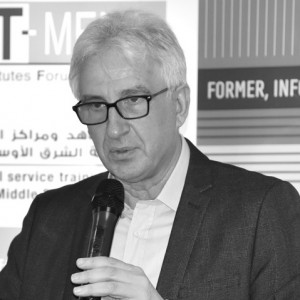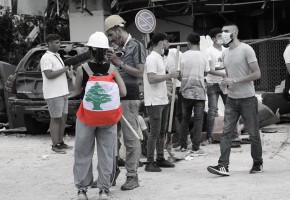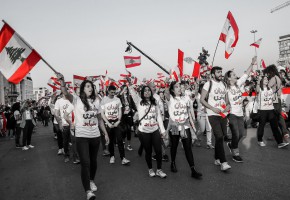
Adib Nehmeh

Lebanon’s Social Safety Network: “A safety” out of reach - Adib Nehme
After a delay of almost two years, the Emergency Social Safety Net in Lebanon (ESSN) was launched with the support of the World Bank, which will include 150 thousand Lebanese families in addition to families already covered by the previous program targeting the poorest of families (NPTP), where both programs will cover around 200 thousand Lebanese families with similar aid packages. These families represent about 20% of the total Lebanese households. The planned support includes cash transfers in US dollars up to a maximum of 125 USD on a monthly basis (for a family of 6 members maximum), plus an additional financial support for the eligible and beneficiary families in order to reduce school drop-outs, for each family having a child aged between 13 and 18 years.
1- What are the observations noted on this program and before that on the approach itself?
Since the purchasing power of households has collapsed by about 90% as a result of a combination of factors, the most important of which is the collapse of the exchange rate, the partial support approach of the poorest families is no longer appropriate for Lebanon. As a result, at least 75% of Lebanese households are unable to cover their basic needs and need financial support to close the gap between their income and their expenses. This corresponds to practically all households whose monthly income falls below the threshold of 2.4 million Lebanese pounds, which represents 73% of the total households in Lebanon.
This income used to represent 1.600 USD before the collapse, and is now equal to only 100 USD, while the minimum wage was previously 450 USD (675 Lebanese pounds). However the program only covers “the poorest” which is 18% of families whose income is less than the minimum wage (less than 675 Lebanese pounds according to the Department of Statistics). The issue is that regardless of the labels and criteria for the poorest, the actual need is to cover three to four times the households covered by the current program. However, the coverage was determined based on the available funding (246 million dollars as a loan from the World Bank).
2 – More than is based on actual need (which is 75% of families).
3 – The category targeted by this program and that can benefit from an average of 100 USD monthly, is the lowest wage category (18-20% as previously mentioned). What this instant support will lead to, is that a beneficiary family whose monthly income is approximately 500 thousand Lebanese pounds (for instance), will instantly benefit from 2.5 million Lebanese pounds, raising its income to 3 million Lebanese pounds. Whereas, a family having an income of 1 million Lebanese pounds or 1.5 million Lebanese pounds, will remain intact.
Hence, in terms of hierarchy of income groups, the lower (fifth in order) segment will move to being the second segment and the third and fourth segments and the old second segment section will move to the lower tier. Of course, this will generate new social disparities and tensions, which the authors of the draft have not noticed.
4- As for the beneficiaries of the additional school support, being the children of the same families benefiting from the first aid, the following situation will occur: let us suppose there are 40 students in the seventh or eighth grade in a public school, 15 of which belong to families who benefit from the "Aman" program. These will receive a direct aid to cover their education expenses in addition to the expenses and contributions of parents to the school fund. However, the same class will include 25 children who are not part of this aid. Therefore, the program will result in the creation of a new class within the class of the poor themselves, within the same school and classroom. This also has negative consequences, whereas the only logical solution is, perhaps, the real and immediate commitment to support the public school and to universal free and compulsory education of adequate quality rather than these fragmented, harmful and unhelpful measures.
5 - It is mandatory to note that this program was financed through a loan from the World Bank (246 million dollars). Which means that this new debt will be added to Lebanon’s large debt (which until recently already amounted up to 170% of the Gross Domestic Product - GDP). This will also burden citizens who have to repay the loan and its interests due to the government's choice to proceed with the financing plan through borrowing instead of referring to local financing sources, especially taxes on wealth and high incomes, for example. In an attempt to finance a wider coverage, the government even tried to transfer another World Bank loan to Lebanon dedicated for public transport, and amounted for 350 million dollars, in order to expand the coverage. The World Bank rejected the loan due to program management considerations. The civil society forces disapproved of the government's approach. In fact, there is an urgent need for public transportation, which would contribute to reducing the burden on the families’ budget, since 10-12% of it in Lebanon was spent on transport due to the lack of public transportation, in addition to other economic and financial advantages in light of the crisis, as well as environmental benefits.
6 -A dispute erupted between the World Bank and the Lebanese government over the management of the project. While the World Bank insisted on managing the project in accordance with its own rules and under its direct supervision and with relative independence from the control of ministries and official institutions in determining beneficiaries, the government, the parliament and the leaders of the active parties have endeavored to increase their role, and the role of ministries, government agencies and municipal councils in the management of the program, especially the selection of beneficiaries and the distribution process. Such efforts aim to use the program for electoral purposes and to renew political loyalty by facilitating or ensuring their support by interfering in the selection and distribution. These attempts have failed, but that does not mean that there are sufficient guarantees to address some gaps in the implementation. The lesson learnt here is to treat the support program as an opportunity to increase clientelism and political and electoral recruitment.
7- Finally, despite the executive details, the same approach is inappropriate for a country going through a generalized impoverishment and the overall deterioration of the living standard, affecting the entire population except for a few tranches at the top of the pyramid of political or financial and economic power, and some other groups having incomes in hard currencies. Although such a situation requires the transition from a system of social safety nets based on targeting, to a system of universal, right-based social protection, or at least the adoption of a social protection platform as proposed by the United Nations. There is no indication of a government orientation in this direction.
However, fragmented policies, improvised actions and decisions, waste and systematic looting of public and private resources persist.
Moreover, a situation of this kind requires immediate initiation of economic relaunching, the control of the financial and monetary situation, restructuring of banks, in addition to considering public policies as the most effective means of alleviating poverty and reducing the new inequalities generated during the period of collapse.
The government's approach almost promotes that this partial and minor safety net program is a solution to the issue of poverty. They also consider it an alternative to public policies in health, education, housing and public transport, as well as an alternative to initiating the restructuring of banks and the release of reserved or looted deposits, and all other necessary reforms.
Adib Nehme
Recent publications

ANND Newsletter January 2026 - From Davos to the UPR: Between Promises, and Accountability
Related publications


